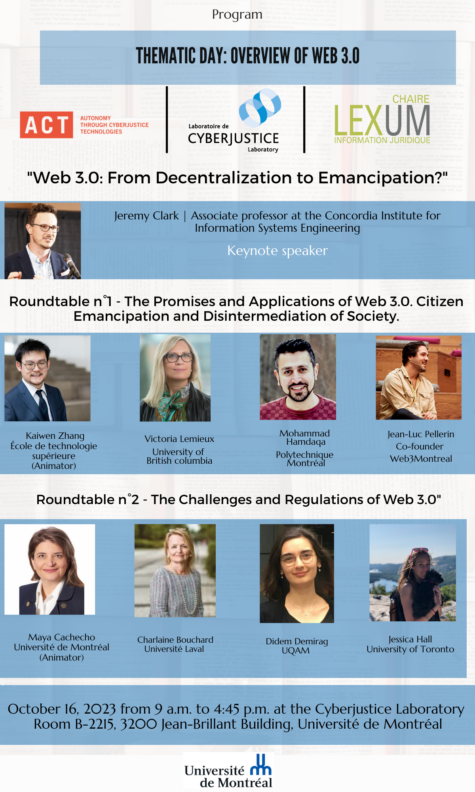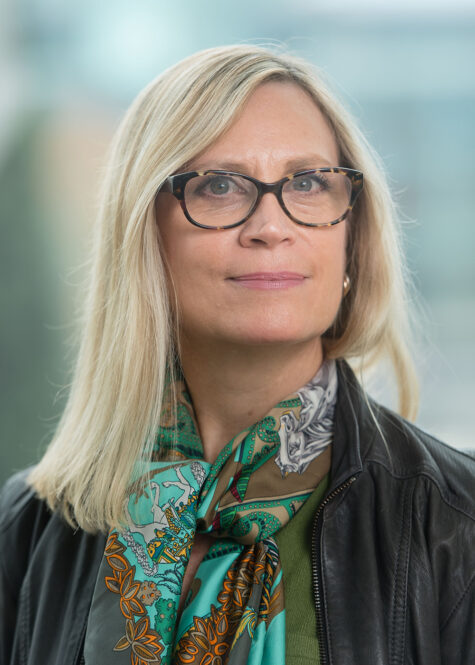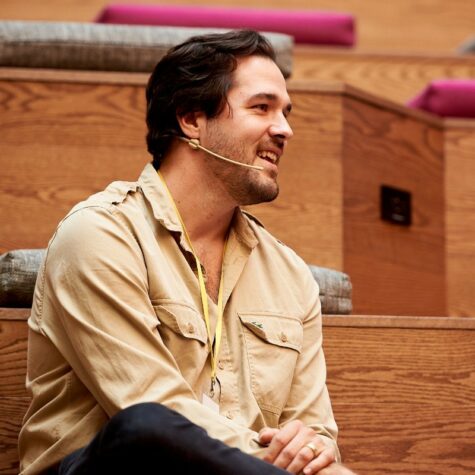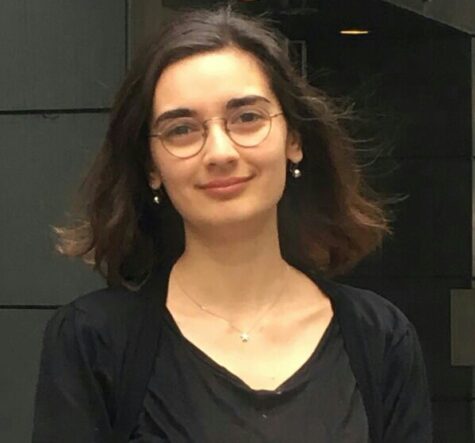Le Web 3.0 : de la décentralisation à l’émancipation ?
16 October 2023 • 9H 16H45
Laboratoire de cyberjustice (B-2215), Pavillon 3200 Jean-Brillant, Université de Montréal
“Agriculture destroyed the chief, forcing a transition to oligarchy. Industrialization destroyed the king, forcing a transition to democracy. The information revolution, coupled with globalization, is eroding representative government and forcing a transition toward something completely new." Michael Mason et Matthew Spoke, "Programmable Trust"

Succeeding to the first-generation encyclopedic web and the social or participatory web, Web 3.0 heralds the "Great Decentralization" era, a new Internet age marked by a fiduciary governance model embedded in technology. This new concept arises in reaction to Big Techs' "Great Domination" as to both digital infrastructures and access to content, with the creation of gigantic databases on and by the third-party users as well as the burgeoning of a new data-driven economy. The advent of Web 3.0 promises an open, distributive, freely accessible, reliable and verifiable self-driven cyberspace (even) without trusted intermediaries, where the Web 2.0 "consumer" finally becomes "citizen" of the world. Our data economy is morphing into a sharing or collaborative economic model restoring for all the freedom to act, work and live. The use of distributed ledgers to record and validate cryptocurrency-based transactions executed by smart contracts is indeed undermining the pivotal role taken up thus far by our financial institutions and governments as recognized trusted intermediaries. From finance (deFi) to business (DAO) and user data management, the commitment of decentralization is on everyone's lips. Yet, is Web 3.0 really leading to a democratic Internet? The Bitcoin White Paper, released in the midst of the 2008 banking and financial crisis, purportedly depicted a peer-to-peer electronic payment system that stands out as an alternative - and critique - to our existing financial system. That said, the high energy cost required for validating blockchain transactions could only be borne by a minority of miners, and favours the concentration of decision-making power in the hands of a "privileged" few. More fundamentally, concerns raised by the prospect of crypto-capitalism would be less about its novelty than the temporary nature of its empowerment promise which will soon be exploited and reclaimed by the States, (other) traditional trusted intermediaries, and even the Big Tech of Web 2.0. Besides short-term compliance issues, long-term regulatory reforms are in the process of being crystallised so to absorb, firmly and lastingly, Web 3.0 into the existing regulatory framework: one may think in particular of the (new) taxation of virtual currencies, sweeping control measures against money laundering and terrorist financing, or the rise of DAOs as a new recognized LLC legal structure. As governments, central banks and social networks are creating their own digital currencies and maintaining their own distributed ledgers in the name of improving public services and user experience, what would ultimately remain of the decentralization ideals of Web 3.0?
Keynote Speaker
Jeremy Clark
Prof. Jeremy Clark is an associate professor at the Concordia Institute for Information Systems Engineering. At Concordia, he holds the NSERC/Raymond Chabot Grant Thornton/Catallaxy Industrial Research Chair in Blockchain Technologies. He obtained his PhD from the University of Waterloo, where his gold medal dissertation was on designing and deploying secure voting systems including Scantegrity—the first cryptographically verifiable system used in a public sector election. He wrote one of the earliest academic papers on Bitcoin, completed several research projects in the area, and contributed to the first textbook. Beyond research, he has worked with several municipalities on voting technology and testified to both the Canadian Senate and House finance committees on Bitcoin.

Roundtable n.1 – The Promises and Applications of Web 3.0 – Citizen Empowerment and Society's Disintermediation
Speakers
Prof. Kaiwen Zhang (host)
Kaiwen Zhang is an Associate Professor in the Department of Software and IT Engineering at ÉTS Montréal (University of Québec). Previously, he was an Alexander von Humboldt postdoctoral fellow in Computer Science at the TU Munich (2015-2017) and a member of the Middleware Systems Research Group. Dr. Zhang obtained his B.Sc. and M.Sc. at McGill University in Montréal and his Ph.D. at the University of Toronto. His research interests include blockchain technologies, publish/subscribe systems, massively multiplayer online games, and software-defined networking. Dr. Zhang's expertise lies at the intersection of distributed systems, networking, and data management. His research is published in premier distributed systems conferences such as IEEE ICDCS and ACM Middleware.

Prof. Victoria L. Lemieux
Prof. Victoria L. Lemieux is Professor of Archival Science at the University of British Columbia School of Information. She is also Founder of Blockchain@UBC, the University of British Columbia’s Blockchain research and education cluster, a Sauder School of Business Distinguished Scholar and a Faculty Associate of the Institute for Computing, Information and Cognitive Systems at UBC. Her interests include risk to the availability of trustworthy records through an archival theoretic lens, in particular in blockchain record keeping systems, and how these risks impact upon transparency, financial stability, public accountability and human rights. Between 2014-2016, Dr. Lemieux worked with the World Bank on transparency and information management to support economic and social development and led various big data analytics projects. Dr. Lemieux has also been a consulting Chief Information Security Officer for the AI-driven personalized healthcare company, Molecular You, and is currently an advisor to the digital health company, Lifeguard Digital Health. Dr. Lemieux has won several awards for her research and contributions to the field of archives, records management, and cybersecurity, including receiving a 2015 Emmett Leahy Award for contributions to the field of records management, a 2015 World Bank Big Data Innovation Award, and a 2020 Blockchain Ecosystem Leadership Award and was recognition as one of Canada's Top 20 Women in Cyber Security in 2020 by IT World. Her latest publications including “Building Decentralized Trust: Multidisciplinary Perspectives on the Design of Blockchains and Distributed Ledgers” (Springer, 2021) and “Searching for Trust: Blockchain in an Age of Disinformation (Cambridge University Press, 2022).

Prof. Mohammad Hamdaqa
Mohammad Hamdaqa is an Assistant Professor at the Department of Computer Engineering and Software Engineering at Polytechnique Montréal (Canada), where he leads the Software and Emerging Technologies Lab. He is also an Adjunct Professor at the Department of Computer Science and a co-founder of the Centre of Financial Technology at Reykjavik University (Iceland). Hamdaqa received a Ph.D. in Software Engineering from the University of Waterloo in Canada in 2016. He holds a Bachelor's degree in Computer Engineering, a Master of Applied Science (Software Engineering), and a Master of Business Administration (MBA) with a minor in Management Information Systems (MIS). Hamdaqa's work focuses on the interplay between emerging technologies and software applications, particularly how software engineering approaches, methods, and practises can be tailored to tame the complexities of building and deploying applications for the new emerging platforms. He is interested in exploring how models and model-driven engineering can empower the development of intelligent systems, as well as how machine learning and generative AI work in tandem with models to revolutionize the conceptualization of trustworthy software systems, ultimately enabling software development through user-friendly low-code platforms accessible to citizen developers. Hamdaqa has made contributions and published papers in the areas of model-driven software engineering, cloud computing, and blockchain. He is a Member of the IEEE Computer Society (CS), the Association for Computing Machinery (ACM) and the Icelandic Blockchain Foundation."

Jean-Luc Pellerin
Jean-Luc Pellerin is the co-founder and president of Web3Montreal, as well as the co-founder and director of operations at Dunes Agency. He holds a degree in civil engineering from École de Technologie Supérieure. His professional experience is extensive and includes research and development, board advisory roles, project management, product management, business analysis, business development, sectoral and regional economic development, financing and fundraising, team building, international relations, economic intelligence, community organization, event planning, strategic consulting for both public and private enterprises, as well as non-profit organizations, public speaking, and numerous other skills.

Roundtable n.2 - Challenges and Regulations of Web 3.0
Speakers
Prof. Maya Cachecho (host)
Maya Cachecho holds a doctoral degree in law from the University de Montréal. Her research focuses on corporate law, the functioning of the financial market, and the collateralization of intermediary securities (in Quebec, national, and international law). She is currently leading two research projects concerning legal issues related to financial intermediation practices and the legal and ethical considerations surrounding the use of financial technologies (Fintech). Maya Cachecho teaches at all three levels of university education, including the general doctoral seminar, business law, security law, private international law, and the fundamentals of private law. She played a key role in establishing the Quebec Institute for Law Reform and Justice (Institut québécois de réforme du droit et de la justice or IQRDJ), being its inaugural director-general. Additionally, she coordinated the major research partnership Access to Law and Justice (Accès au droit et à la justice or ADAJ) for several years.

Prof. Charlaine Bouchard
Prof. Charlaine Bouchard is a notary and professor in business law at the Faculty of Law of Université Laval since 1998. She has a doctorate in law from the Université de Paris I Panthéon Sorbonne (1996) and a postdoctoral degree from the Faculty of Law of Laval University (1997). Specializing in business law, e-commerce, and blockchain, Professor Bouchard is the author of over a hundred scientific or professional articles and nine books. Among other publications, she authored the only Quebec treatise (2 volumes) on business law published by Éditions Yvon Blais, titled "Droit et pratique de l’entreprise" (Volume 1: 1999, 2007, 2014, 2021; Volume 2: 2005, 2014, 2022; 1500 pages). In 2003, Ms. Bouchard co-founded the first research center in economic law at the Faculty of Law. She also created the "Bulletin de droit économique," an online scientific blog that has become a reference in Quebec business law. She has been actively involved in various organizations and has served on multiple committees and boards of directors, including the Quebec Heart and Lung Institute (2015-2018), the Chamber of Notaries of Quebec (2011-2014), and the Professional Liability Insurance Fund of the Chamber of Notaries of Quebec (2000-2015), where she held the vice-presidency. She currently serves on the scientific committee of the "Revue du notariat" and is a member of the board of directors of the Institute of Governance and the advisory committee of Scenarex. Together with a group of students, she established "Pensez Blockchain," a website aimed at introducing the emerging blockchain technology to the entire Quebec population and promoting its social acceptance. Since 2020, she has held the position of Chair in Smart Contracts and Blockchain Research - Chamber of Notaries of Quebec, focusing her research activities primarily on blockchain and smart contracts.

Didem Demirag
Mrs. Demirag is a postdoctoral researcher at the Université du Québec à Montréal (UQAM), working under the supervision of Professor Sébastien Gambs. She is currently researching the relationship between equity and privacy in federated learning. She earned her doctoral degree at the Institute for Information Systems Engineering (CIISE) at Concordia University, under the guidance of Professor Jeremy Clark. Mrs. Demirag is interested in cryptography and blockchain technologies. Some of the projects she has been involved in include central bank digital currencies, stable cryptocurrencies, and secure multiparty computations on the Ethereum blockchain. Additionally, she completed a one-year internship at the Autorité des marchés financiers during her doctoral studies.

Jessica Hall
Jessie Hall is a doctoral candidate at the Institute for History and Philosophy of Science and Technology (IHPST) and affiliate of the Schwartz Reisman Institute for Technology and Society (SRI) at the University of Toronto. Her research interests are concentrated in philosophy of computing and computability and the philosophy of AI.

This content has been updated on 20 September 2023 at 14 h 44 min.
